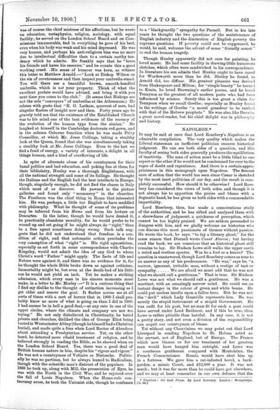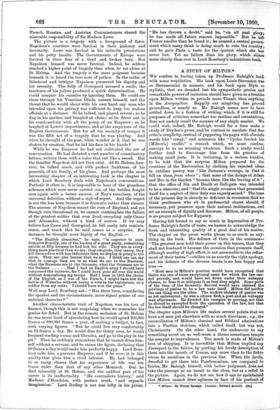NAPOLEON.*
IT may be said at once that Lord Rosebery's Napoleon is an admirable compilation. The very quality which makes the Liberal statesman an inefficient politician ensures historical judgment. He can see both sides of a question, and this faculty of seeing both sides generally produces the equilibrium of inactivity. The man of action must be a little blind to one aspect or the other if he would not be condemned for ever to the rages of doubt and repentance. And there is a certain appro- priateness in this monograph upon Napoleon. The fiercest man of action that the world has seen since Ctesar is sketched by the most inert politician of our day, and the result is com- pletely successful. How should it be otherwise ? Lord Rose- bery has considered the views of both sides, and though it is not always his to apportion the praise and blame with a dogmatic hand, he has given us both sides with a commendable impartiality.
Lord Rosebery, then, has made a conscientious study of the authorities, and he has sifted and analysed them with a shrewdness of judgment, a quickness of perception, which cannot be too highly praised. We are seldom persuaded to disagree with him, and we gladly welcome an historian who can discuss this most passionate of themes without passion. He wrote the book, he says, "to lay a literary ghost," for the same reason that Disraeli wrote Count Alarms ; but having read the book, we are conscious that an historical ghost still remains to lay. Sir Hudson Lowe still walks the upper earth a weird and restless spectre. Was he a fool or a knave P The question is unanswered, though Lord Rosebery comes as near to an answer as any of his predecessors. "He was," says he, "a narrow, ignorant, irritable man, without a vestige of tact or sympathy We are afraid we must add that he was not what we should call a gentleman." That is true. Sir Hudson Lowe was not what we should call a gentleman. He was a martinet, with an amazingly narrow mind. He could see an instant danger in the colour of green and white beans. He could put useless insults upon a fallen hero. But he was not the " devil" which Lady Granville represents him. He was merely the stupid instrument of a stupid Government. He was unfit for his post, but no man fit for such a post could have served under Lord Bathurst, and if this be true, then Lowe is rather pitiable than hateful. In any case, it is not a pretty story, and not even a division of the responsibility can acquit our countrymen of blame.
Yet without any Chauvinism we may point out that Lord Liverpool in sending Napoleon to St. Helena acted as the servant, not of England, but of Europe. The France which now blames us for our treatment of her greatest man would have hanged him outright, and Lowe was a courteous gentleman compared with Montehenu, the French Commissioner. Russia would have shut him up in a fortress. We gave him a rat-infested hovel, a back- garden, a mimic Court, and £12,000 a year. It was not much; but it was far more than he could have got elsewhere, and we may at least remember in our own defence that the
• Napoleon : the Last Phase. By Lord Rooebery. London : Humphreys. 176. 6c1.]
French, Russian, and Austrian Commissioners shared the miserable responsibility of Sir Hudson Lowe.
The picture is a tragedy with a foreground of farce. Napoleon's courtiers were farcical in their jealousy and inveracity. Lowe was farcical in his imbecile precautions and his petty insults. The Governments of Europe were farcical in their fear of a tired and broken hero. But Napoleon himself was never farcical. Indeed, he seldom reached a higher point of tragedy than when he sat alone at St. Helena. And the tragedy is the more poignant because beneath it is heard the true note of pathos. In the midst of falsehood and intrigue Napoleon preserved his dignity and his serenity. The folly of Gourgaud aroused a smile, the insolence of his jailors produced a quick determination. He could conquer his enemies by ignoring them. He could see them through his Venetian blinds, unseen himself, and the threat that he would shoot with his own hand any man who intruded upon his privacy was sufficient to keep too zealous officials at a distance. So he talked, and played reversi ; so he dug in his garden, and bungled at chess ; so he drove out in his coach-and-six with all the pomp of an Emperor ; so he laughed at Lowe's impertinence, and at the suspicions of the English Government. But for all his serenity of temper it was the fifth act of a tragedy that he was playing. And when he thought of the past, what wonder is it that he was shaken by emotion, that he hid his face in his hands ?
While he was Emperor he had not cultivated the art of conversation. He had dictated avast number of comminatory letters, written them with a voice that cut like a sword. But the familiar Napoleon did not then exist. At St. Helena, how- ever, he talked much, and with perfect frankness, of his generals, of his family, of his plans. And perhaps the most interesting chapter of an interesting book is the chapter in which Lord Rosebery deals with Napoleon's conversations. Pathetic it often is; it is impossible to hear of the grandiose schemes which were never carried out, of the battles fought over again with a better success, of Ney's treachery, of the universal defection, without a sigh of regret. And the regret is not the less keen because it is dramatic rather than sincere. The success of Napoleon meant the ruin of England, and yet though ruin threatened us, we cannot contemplate the failure of the greatest soldier that ever lived, excepting only Cresar and Alexander, without a kind of sorrow. If we may believe Las Cases and Gourgaud, he fell easily into reminis- cence, and much that he said comes as a surprise. For instance, he thought most highly of the English :—
"The English character," he says, "is superior to ours. Conceive Romilly, one of the leaders of a great party, committing suicide at fifty because he had lost his wife. They are in every- thing more practical than we are : they emigrate, they marry, they kill themselves with less indecision than we display in going to the opera. They are also braver than we are. I think one can say that in courage they are to us what we are to the Russians, what the Russians are to the Germans, what the Germans are to the Italians Had I had an English army I should have conquered the universe, for I could have gone all over the world without demoralising my troops. Had I been in 1815 the choice of the English as I was of the French, I might have lost the battle of Waterloo without losing a vote in the legislature, or a soldier from my ranks. I should have won the game."
Well may Lord Rosebery ask : " Has there been, considering the speaker and the circumstances, more signal praise of our national character P "
Another characteristic trait of Napoleon was his love of finance, though this is not surprising when we remember his genius for detail. But in the remote seclusion of St. Helena he was never tired of speculating how be would spend 200,000 francs or 600,000 francs a year, of making a budget, in fact, with varying figures. "But he could live very comfortably on 12 francs a day. He would dine for thirty sons, he would frequent reading rooms and libraries, and go to the play in the pit." Then he suddenly remembers that he cannot dress him- self without a servant, and he raises the figure, declaring that 20 francs a day would make him perfectly happy. Lord Rose- bery calls him a parvenu Emperor, and if he were, it is this quality that gives him a vivid interest. He had belonged to so many classes that his experience of life was ten times wider than that of any other Monarch. But he died miserably at St. Helena, and the saddest part of his career is its ineffectuality. " He contradicts history," said Madame d'Houdetot, with perfect truth, "and expands imagination." Lord Dudley is not less lofty in his praise.
"He has thrown a doubt," said he, "on all past glory he has made all future renown impossible." But he left France smaller than he found it; he created a central govern.. ment which many think is doing much to ruin the country; and he gave Paris a taste for the firatant which she has never lost. Yet no failure dims his glory, which shines more clearly than ever in Lord Rosebery's industrious book.







































 Previous page
Previous page